Essays
Essays

Speculative Facts
Department of Speculative Facts
The Department of Speculative Facts connects two seemingly contradictory approaches: Speculation which attempts to think and act beyond existing knowledge and structures, and fact-checkers in search for a solid consensus on which our reality can be built. When stretching knowledge and speculating with fiction, what sense of responsibility is needed in times of democratized opinions and fake news? Learning from the other SF—Science Fiction—we think of speculation through facts, and facts through speculation, to situate truth culturally.
The backbone of this book is an e-mail exchange between two fact-checkers from the New York Times Magazine, which we handed over to artists to re-write, re-perform, and re-design. The publication includes the original letters, workshop scripts, as well as additional texts by philosophers, journalists, writers, and artists looking at new social contracts, with which we can anchor ourselves in the present.
Department of Speculative Facts is Lietje Bauwens, Quenton Miller, Karoline Świeżyński.
Contributions by Sepake Angiama, Lietje Bauwens (DoSF), Kate Briggs, Federico Campagna, Alex Carp & Jamie Fisher (NEW YORK TIMES MAGAZINE), Mette Edvardsen, Tristan Garcia, Maryam Monalisa Gharavi, Nicoline van Harskamp, Quenton Miller DoSF, Ingo Niermann, Michael Portnoy, Achal Prabhala with WIKIAFRICA, FACT FACTORIES, AFRICA CHECK, CHIMURENGA, Wolfgang Tillmans, Bob Trafford (FORENSIC ARCHITECTURE).
Design by Karoline Świeżyński
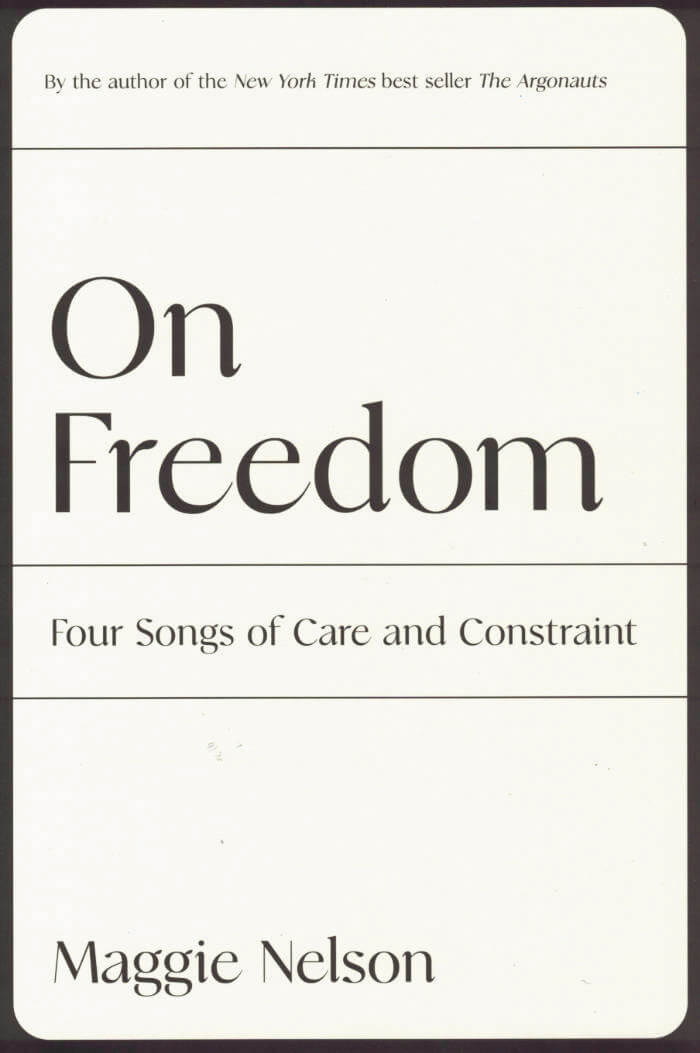
On Freedom: Four Songs of Care and Constraint
So often deployed as a jingoistic, even menacing rallying cry, or limited by a focus on passing moments of liberation, the rhetoric of freedom both rouses and repels. Does it remain key to our autonomy, justice, and well-being, or is freedom's long star turn coming to a close? Does a continued obsession with the term enliven and emancipate, or reflect a deepening nihilism (or both)? On Freedom examines such questions by tracing the concept's complexities in four distinct realms: art, sex, drugs, and climate.
Drawing on a vast range of material, from critical theory to pop culture to the intimacies and plain exchanges of daily life, Maggie Nelson explores how we might think, experience, or talk about freedom in ways responsive to the conditions of our day. Her abiding interest lies in ongoing "practices of freedom" by which we negotiate our interrelation with, indeed, our inseparability from others, with all the care and constraint that entails, while accepting difference and conflict as integral to our communion.
For Nelson, thinking publicly through the knots in our culture, from recent art-world debates to the turbulent legacies of sexual liberation, from the painful paradoxes of addiction to the lure of despair in the face of the climate crisis, is itself a practice of freedom, a means of forging fortitude, courage, and company. On Freedom is an invigorating, essential book for challenging times.
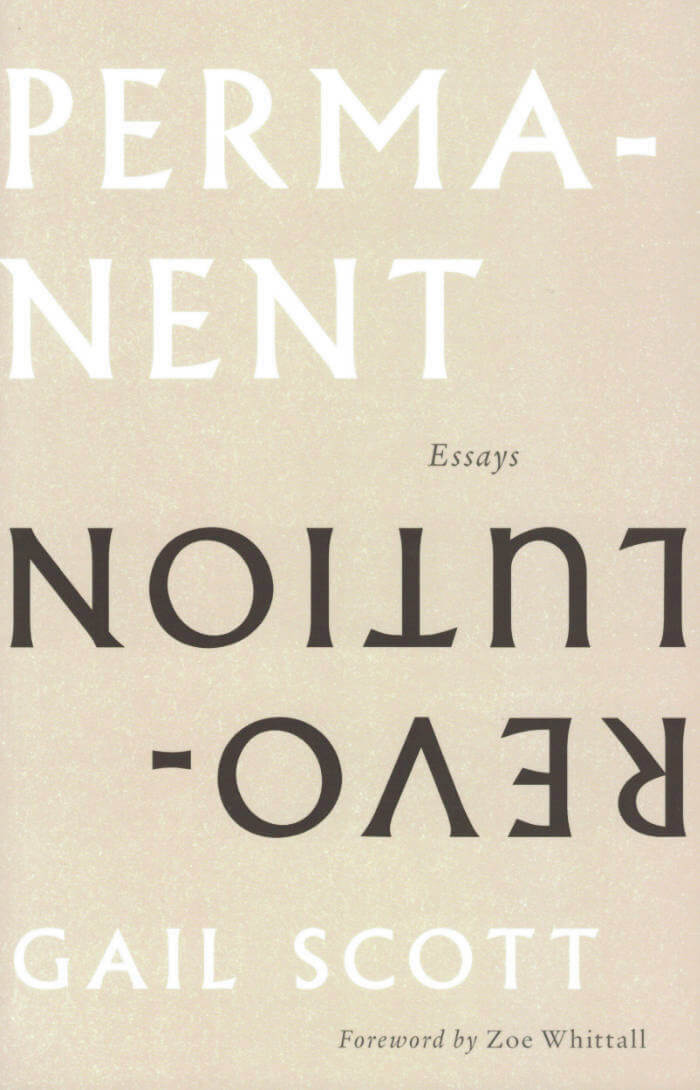
Permanent Revolution: Essays
From iconic feminist writer Gail Scott comes Permanent Revolution, a collection of new essays gathered alongside a recreation of her groundbreaking text, Spaces Like Stairs. In conversation with other writers working in queer/feminist avant-garde trajectories, including l'écriture-au-féminin in Québec and continental New Narrative, these essays provide an evolutionary snapshot of Scott's ongoing prose experiment that hinges the matter of writing to ongoing social upheaval. Scott herself points to the heart of this book, writing, "Where there is no emergency, there is likely no real experiment."
With a Foreword by Zoe Whittall and an Afterword by Margaret Christakos.
Gail Scott is the author of Spare Parts (1981), Heroine (1987, re-issued in 2019 with an introduction by Eileen Myles), Main Brides (1993), My Paris (1999), Spare Parts Plus Two (2002), and The Obituary (2010). Her essays are collected in Spaces Like Stairs (1989) and in La Théorie, un dimanche (1988) which was translated into English as Theory, A Sunday (2013). Scott is co-editor of the New Narrative anthology: Biting the Error: Writers Explore Narrative (2004). Her translation of Michael Delisle's Le désarroi du matelot was shortlisted for a 2001 Governor General's Literary Award. A memoir, based in Lower Manhattan during the early Obama years, is forthcoming. Scott lives in Montréal.

Fórum do Futuro – Vita Nova
Jenna Sutela, Filipa Ramos and 2 more
A collective book that proposes to question human and non-human existence in the current social context, spanning different cosmogonic views.
The Vita Nova editorial project had its genesis in the Fórum do Futuro: a programme of debates, artist talks, and performances, held annually in the city of Porto, that brings together guests from different artistic and scientific practices to reflect on fundamental issues for contemporary societies. Given the impossibility of holding the 2020 edition, due to the challenges posed by the pandemic, the Fórum do Futuro is instead presenting a book that proposes to question human and non-human existence in the current social context, spanning different cosmogonic views. The book consists of four thematic sections that combine different artistic, scientific, philosophical and technological perspectives in written and visual essays, stories and interviews.
Texts by Sophia Al-Maria, K Allado-McDowell, Shumon Basar, Guilherme Blanc, Rosi Braidotti, Octavia Butler, Ted Chiang, GPT-3, Alexis Pauline Gumbs, Kirsten Keller, Filipa Ramos, Tabita Rezaire, Jenna Sutela, Denise Ferreira da Silva, Suzanne Treister, Aby Warburg, Chandra Wickramasinghe, Feifei Zhou.
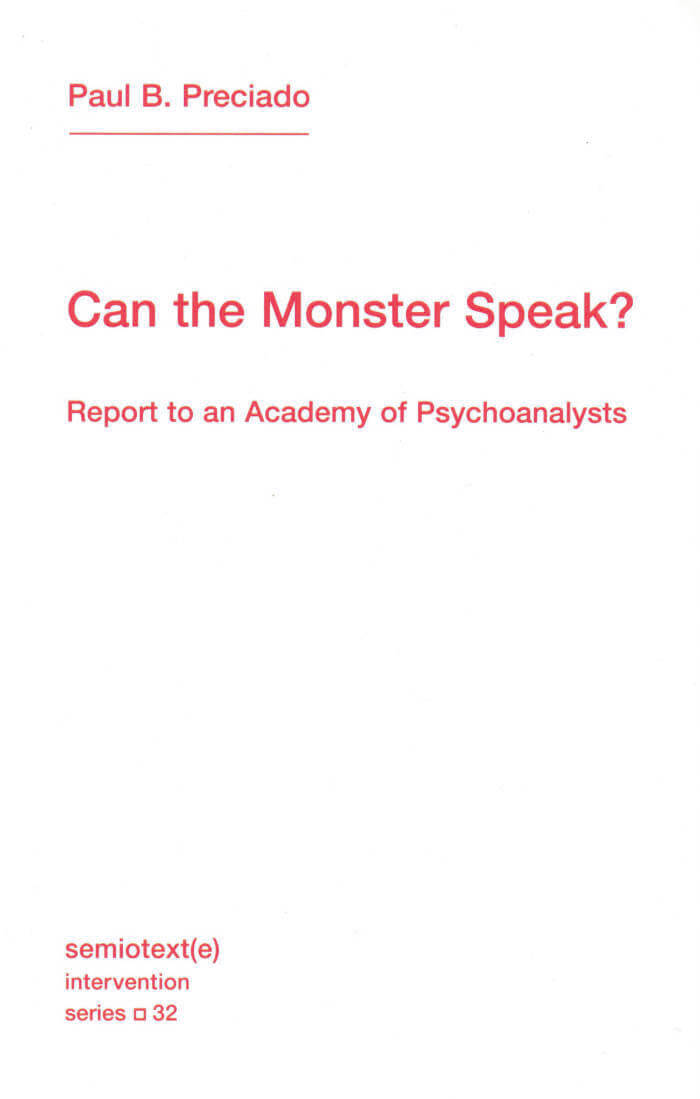
Can the Monster Speak?: Report to an Academy of Psychoanalysts
Paul Preciado's controversial 2019 lecture at the École de la Cause Freudienne annual conference, published in a definitive translation for the first time.
In November 2019, Paul Preciado was invited to speak in front of 3,500 psychoanalysts at the École de la Cause Freudienne's annual conference in Paris. Standing in front of the profession for whom he is a mentally ill person suffering from gender dysphoria, Preciado draws inspiration in his lecture from Kafka's Report to an Academy, in which a monkey tells an assembly of scientists that human subjectivity is a cage comparable to one made of metal bars.
Speaking from his own mutant cage, Preciado does not so much criticize the homophobia and transphobia of the founders of psychoanalysis as demonstrate the discipline's complicity with the ideology of sexual difference dating back to the colonial era, an ideology which is today rendered obsolete by technological advances allowing us to alter our bodies and procreate differently. Preciado calls for a radical transformation of psychological and psychoanalytic discourse and practices, arguing for a new epistemology capable of allowing for a multiplicity of living bodies without reducing the body to its sole heterosexual reproductive capability, and without legitimizing hetero-patriarchal and colonial violence.
Causing a veritable outcry among the assembly, Preciado was heckled and booed and unable to finish. The lecture, filmed on smartphones, was published online, where fragments were transcribed, translated, and published with no regard for exactitude. With this volume, Can the Monster Speak? is published in a definitive translation for the first time.
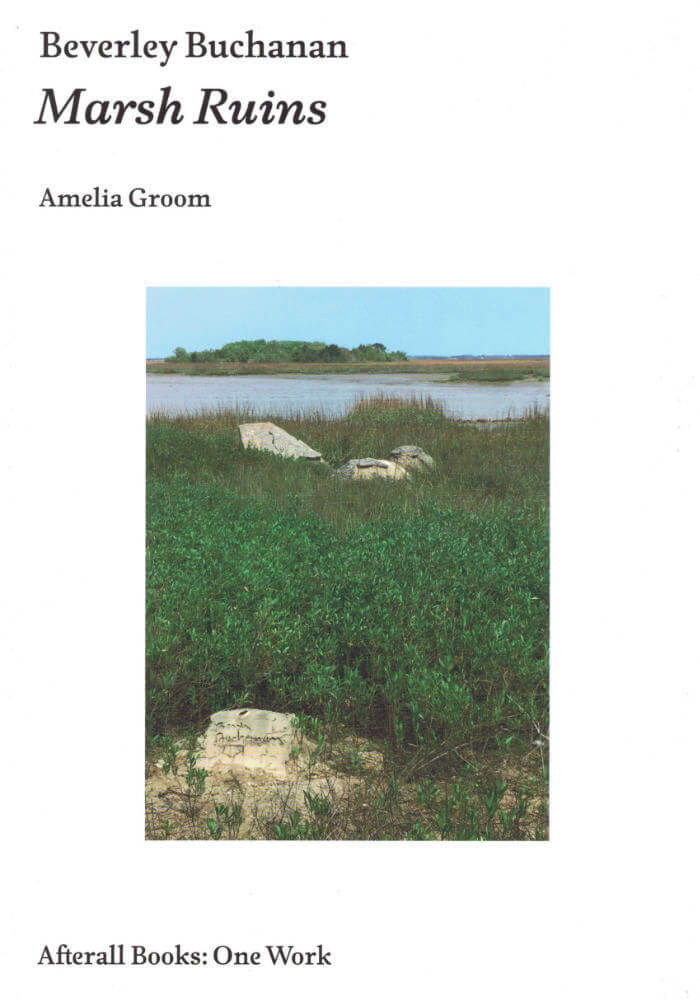
Berverly Buchanan: Marsh Ruins
An illustrated examination of Beverly Buchanan's 1981 environmental sculpture, which exists in an ongoing state of ruination.
Beverly Buchanan's Marsh Ruins (1981) are large, solid mounds of cement and shell-based tabby concrete, yet their presence has always been elusive. Hiding in the tall grasses and brackish waters of the Marshes of Glynn, on the southeast coast of Georgia, the Marsh Ruins merge with their surroundings as they enact a curious and delicate tension between destruction and endurance. This volume offers an illustrated examination of Buchanan's environmental sculpture, which exists in an ongoing state of ruination.
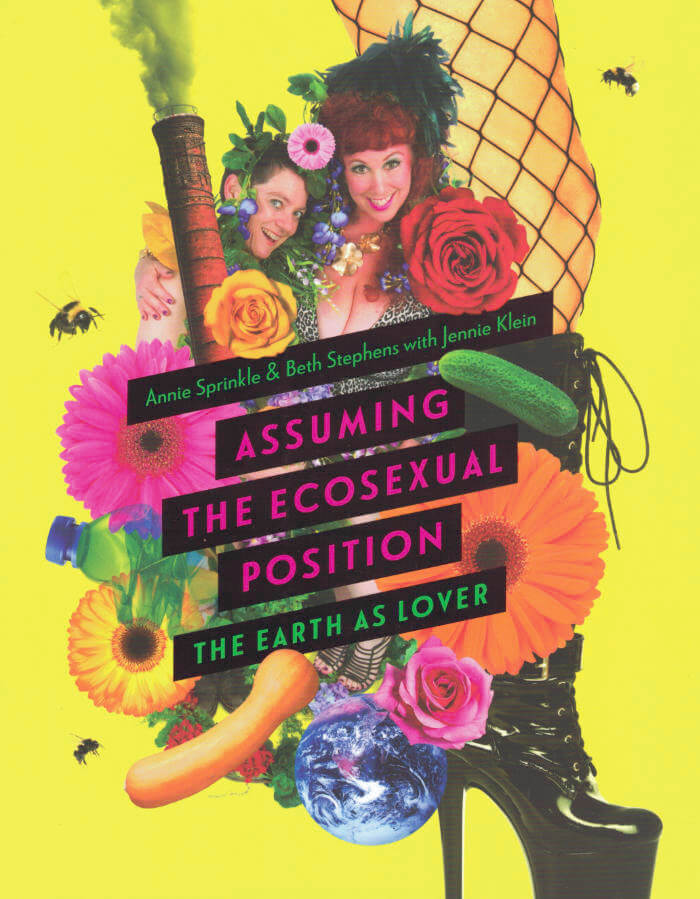
Assuming the Ecosexual Position
Annie Sprinkle, Beth Stephens and 1 more
The story of the artistic collaboration between the originators of the ecosex movement, their diverse communities, and the Earth.
What's sexy about saving the planet? Funny you should ask. Because that is precisely, or, perhaps, broadly, what Annie Sprinkle and Beth Stephens have spent many years bringing to light in their live art, exhibitions, and films. In 2008, Sprinkle and Stephens married the Earth, which set them on the path to explore the realms of ecosexuality as they became lovers with the Earth and made their mutual pleasure an embodied expression of passion for the environment. Ever since, they have been not just pushing but obliterating the boundaries circumscribing biology and ecology, creating ecosexual art in their performance of an environmentalism that is feminist, queer, sensual, sexual, posthuman, materialist, exuberant, and steeped in humor.
Assuming the Ecosexual Position tells of childhood moments that pointed to a future of ecosexuality, for Annie, in her family swimming pool in Los Angeles; for Beth, savoring forbidden tomatoes from the vine on her grandparents' Appalachian farm. The book describes how the two came together as lovers and collaborators, how they took a stand against homophobia and xenophobia, and how this union led to the miraculous conception of the Love Art Laboratory, which involved influential performance artists Linda M. Montano, Guillermo Gómez-Peña, and feminist pornographer Madison Young. Stephens and Sprinkle share the process of making interactive performance art, including the Chemo Fashion Show, Cuddle, Sidewalk Sex Clinics, and Ecosex Walking Tours. Over the years, they celebrated many more weddings to various nature entities, from the Appalachian Mountains to the Adriatic Sea. To create these weddings, they collaborated with hundreds of people and invited thousands of guests as they vowed to love, honor, and cherish the many elements of the Earth.
As entertaining as it is deeply serious, and arriving at a perilous time of sharp differences and constricting categories, the story of this artistic collaboration between Sprinkle, Stephens, their diverse communities, and the Earth opens gender and sexuality, art and environmentalism, to the infinite possibilities and promise of love.
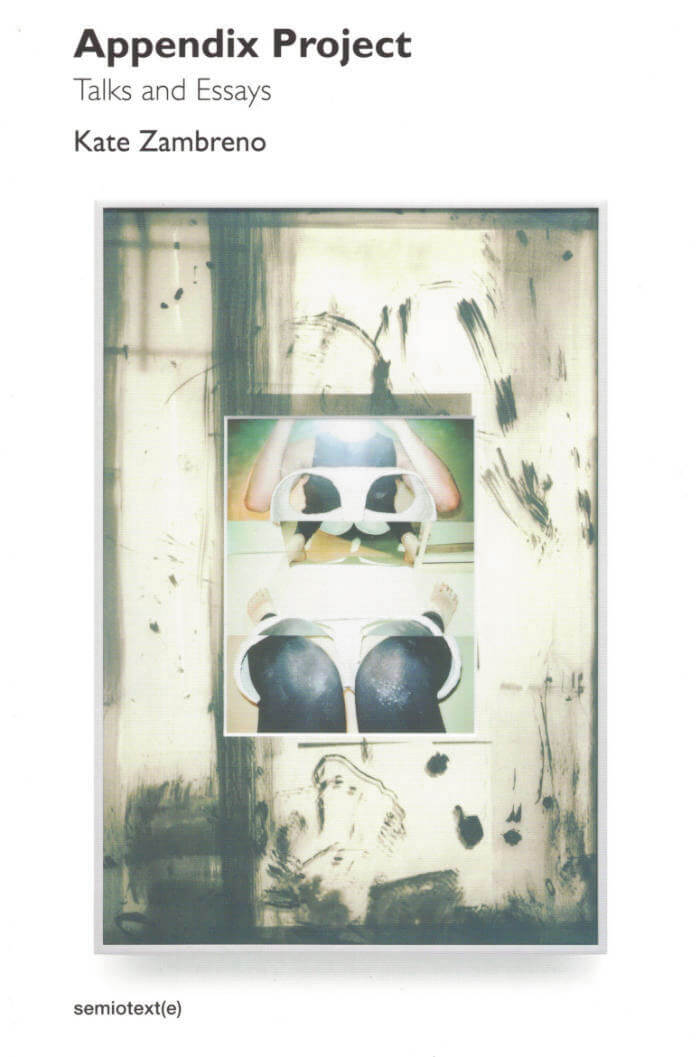
Appendix Project: Talks and Essays
Inspired by the lectures of Roland Barthes, Anne Carson, and Jorge Luis Borges, Kate Zambreno's Appendix Project collects eleven talks and essays written in the course of the year following the publication of Book of Mutter, Zambreno's book on her mother that took her over a decade to write. These surprising and moving performances, underscored by the sleeplessness of the first year of her child's life, contain Zambreno's most original and dazzling thinking and writing to date.
In Appendix Project Zambreno thinks through the work of On Kawara, Roland Barthes, W.G. Sebald, Bhanu Kapil, Walter Benjamin, Theresa Hak Kyung Cha, Marguerite Duras, Marlene Dumas, Louise Bourgeois, Doris Salcedo, Jenny Holzer, and more.
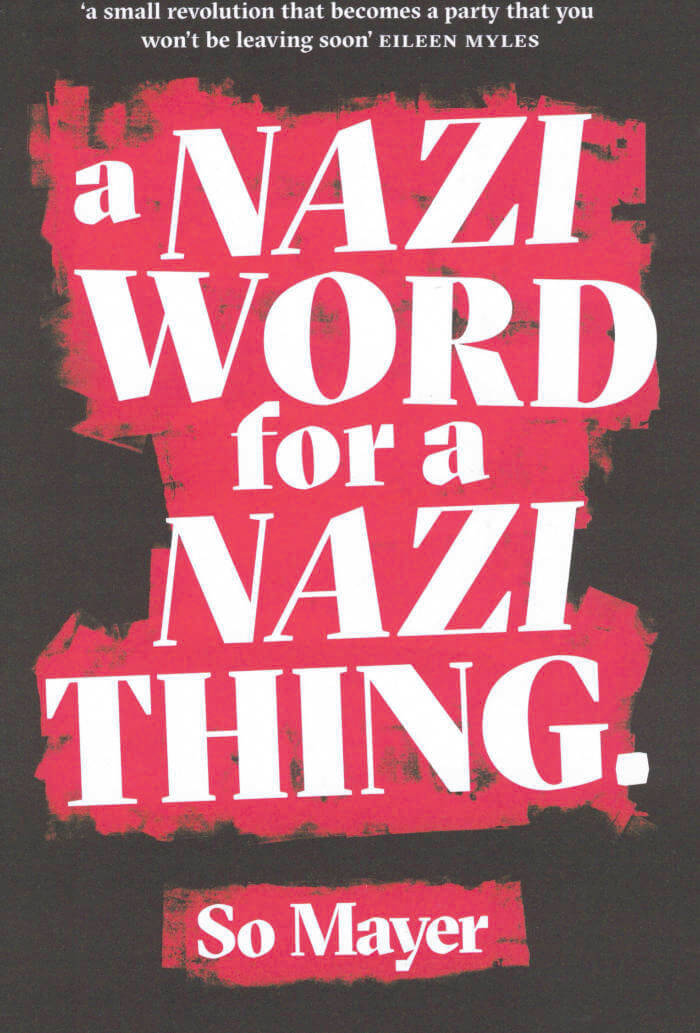
A Nazi Word for a Nazi Thing
An essay on art, bodies and fascism.
In an era where identity politics is being weaponised against the very people it has sought to make visible, how can we reclaim complexity?
In 1937 the Nazis staged an exhibition of seized modernist artworks. Named Entartete ‘Kunst’ – Degenerate ‘Art’ – it sought to define degeneracy, display it and destroy it.This act of violent appropriation is one episode in a long and ongoing history of the erasure of queer and non-normative cultures.
A Nazi Word for a Nazi Thing works against this erasure; it is a manifesto – a catalogue for an exhibition that could never take place. Drawing on work from dissident sexologist Magnus Hirschfeld to South African artist Zanele Muholi, as well as a century of queer cinema from Sergei Eisenstein to Pedro Almodóvar, So Mayer creates an archive of resistance.
‘This book is a small revolution that becomes a party that you won’t be leaving soon. I believe we’re living in a time of fresh erasures, systemic violences working that global pandemic to take some other bodies out. Looking so freshly at the history of queerness, sexual deviance and the long long coordinated erasures of colonialism, bigotry and transphobia the essential non binary nature of art opens up right here like the wildly singing flower it is and So Mayer’s compelling version makes sense, makes me listen.’
— Eileen Myles
‘A Nazi Word for a Nazi Thing is a reflective, creative walk through some of the worst – and best – people of the last hundred years, looking at the power of images and their relationship(s) with text. In a time of rising fascism, So Mayer highlights ways that artists have found strategies of resistance, and offers hope in historical analysis.’
— Juliet Jacques

We are not where we need to be, but we ain't where we were.
Tiphanie Blanc, Lili Reynaud-Dewar and 1 more
We are not where we need to be but, we ain't where we were is the first volume of a new series of publications by the collective Wages For Wages Against that reports on active research engaged within the artistic professions and institutions since 2017. Its aim is to question the underlying neoliberal logics in the contemporary art world, by orienting our object of study towards the struggles that impact it. With this publication, our hope is to put into practice various values specific to the campaign: the existence of a systematic and fair remuneration, a desire for transparency, the sharing of knowledge, and the visibilization of demands proper to the field of the visual arts and concomitant struggles. It is the result of militant experiences, at the convergence of our individual experiences and collective questionings.
With texts by Tiphanie Blanc, Antonella Corsani, Fanny Lallart, Lili Reynaud-Dewar, Ramaya Tegegne and an interview with Outrage Collectif.
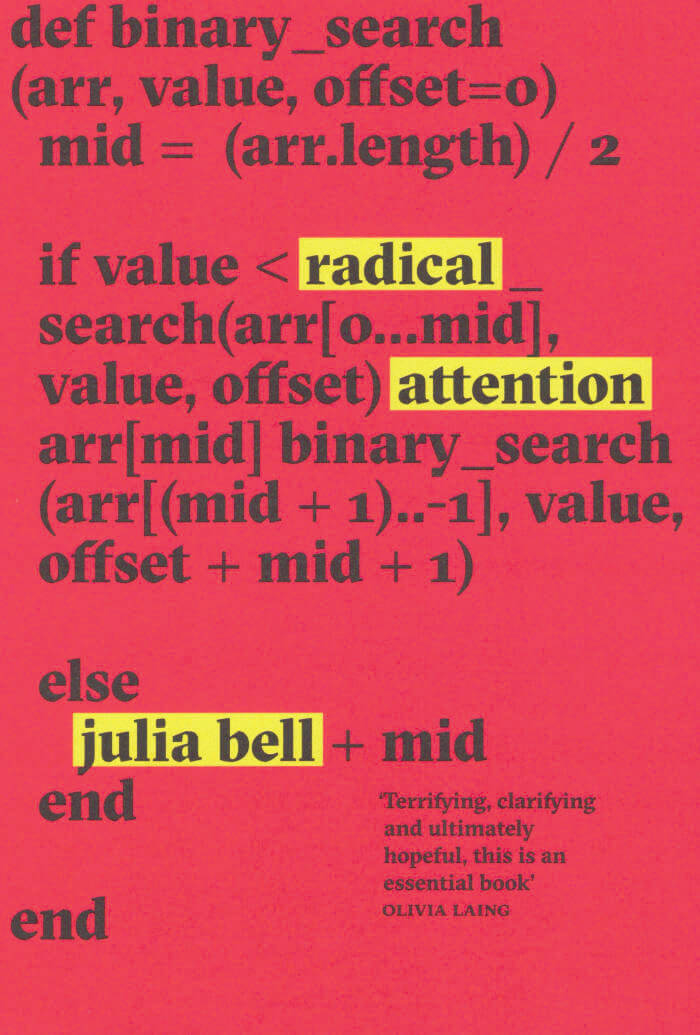
Radical Attention
An essay on the battle for our attention in the age of distraction.
Attention pays. In today‘s online economy it has become a commodity to be bought and sold. Bombarding us with free smartphone apps and news websites, developers and advertisers have turned what and how focus our attention into the world‘s fastest growing industry.
In exchange for our attention, information and entertainment is ever at our fingertips. But at what cost? In this essay, at once personal and polemical, meditative and militant, Julia Bell asks what has been lost in this trade off. How can we reclaim our attention? In a world of infinite distraction, how can attention become radical?
Praise for Radical Attention
‘Terrifying, clarifying and ultimately hopeful, this is an essential book. Julia Bell grapples with the grim realities of our online lives, setting out possibilities for resisting and reclaiming our imperilled freedoms.’ — Olivia Laing
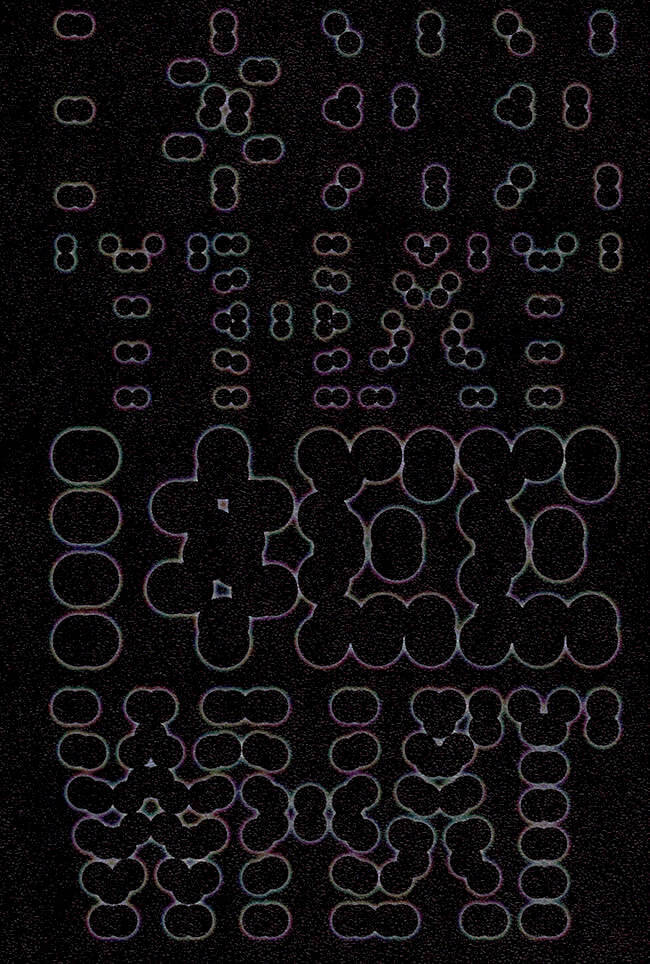
I See That I See What You Don't See
Van Westrenen F., Otero Verzier M.
This “black book” published by Het Nieuwe Instituut presents a layered, non-binary notion of darkness. Navigating through cosmic, automated, and seemingly invisible environments, it delves into what we do not generally get – or choose – to see. Moreover, the book explores the relation between the possibility of seeing and forms of oppression and emancipation.
Contributions by the Academy for Urban Astronauts, Ramon Amaro, Danilo Correale, Jonathan Crary, Aldo van Eyck, Ludo Groen, Bregtje van der Haak, Saidiya Hartman, Marten Kuijpers, Momtaza Mehri, Melvin Moti, Lucy McRae, Johannes Schwartz, Dirk Sijmons, and Leanne Wijnsma.

Funeral Diva
In this collection of personal essays and poetry, acclaimed poet and performer Pamela Sneed details her coming of age in New York City during the late 1980s. Funeral Diva captures the impact of AIDS on black queer life, and highlights the enduring bonds between the living, the dying, and the dead. Sneed's poems not only converse with lovers past and present, but also with her literary forebears - like James Baldwin, Toni Morrison, Audre Lorde - whose aesthetic and thematic investments she renews for a contemporary American landscape. Offering critical focus on matters from police brutality to LGBTQ+ rights, Funeral Diva confronts the most pressing issues of our time with acerbic wit and audacity.
Poet, professor, and performer, Pamela Sneed is the author of Sweet Dreams, Kong, and Imagine Being More Afraid of Freedom than Slavery. She was a Visiting Critic at Yale, and at Columbia University's School of the Arts, and is online faculty at Chicago's School of the Art Institute teaching Human Rights and Writing Art. She also teaches new genres at Columbia's School of the Arts in the Visual Dept. Her work is widely anthologized and appears in Nikki Giovanni's, The 100 Best African American Poems.
Published October 2020
Funeral Divais the Winner of the Lambda Award for Lesbian Poetry.

Electric Brine
Electric Brine is a volume of poetry and critical essays by women voices from diverse fields such as literature, geography, media studies, history of life sciences, sociology, and poetics of science and fiction, each of them central to the independent curatorial research entity The World in Which We Occur (TWWWO, 2014-ongoing) and its associated online study group Matter in Flux.
Conceived as an anthology and a register, it serves as a testimony to the initiative's long-standing work of creative adaptation and ecological inquiry through a quest to situate a vision of material politics through the lens of six punctuated pieces on flow and fluids. The literary and scientific fabulations found in these pages speak of the conjunction of lived embodiment, the materialized quality of language, and the ability to trigger political imagination through reading, writing and witnessing. Each of these strands polyperform under TWWWO, for they can be traced, retroactively, to the themes present in the live event series, to Matter in Flux's private study sessions, to the initiative's collective writing work presented in public venues and publications. Also included in this volume is an appendix documenting the years of invitation and study, intricately linked to the ideological praxis of these overlaps.
Co-founded in 2014 by Jennifer Teets and Margarida Mendes, The World in Which We Occur (TWWWO) is an independent curatorial research-based entity that collaborates with artists, scientists, science historians, philosophers, anthropologists, activists and more as it explores themes concerned with artistic inquiry, philosophy of science, and ecology. TWWWO began as a live talk-event series over the telephone and has thus expanded to other formats involving experiments with educational actions, discursive talks, and events via diverse methodologies.
Introduction by Jennifer Teets and Margarida Mendes.
Texts and contributions by Dionne Brand, Barbara Orland, Sophie Lewis, Esther Leslie, Hannah Landecker, Lisa Robertson.
Graphic design: Sophie Keij & Atelier Brenda.

Politics of Food
This publication critically assesses and illuminates ways in which the arts can confront food-related issues, through the contributions of artists, anthropologists, activists, agronomists, and chefs.
The last decade has witnessed a proliferation of artists and artist collectives interrogating the global politics and ethics of food production, distribution, and consumption.
As an important document of new research and thinking around the subject, this book, co-published with Delfina Foundation, contains reflections on food by prominent artists, anthropologists, and activists, among others. Interviews with chefs, policy makers, and agronomists critically assess and illuminate the ways the arts confront food-related issues, ranging from the infrastructure of global and local food systems, its impact on social organization, alternatives and sustainability, climate and ecology, health and policy, science and biodiversity, and identity and community.
Contributions by Kathrin Böhm, Center for Genomic Gastronomy, Leone Contini, Cooking Sections, Chris Fite-Wassilak, Amy Franceschini & Michael Taussig, Fernando García-Dory, Melanie Jackson, Dagna Jakubowska, Nick Laessing, Jane Levi, Candice Lin, Poppy Litchfield, Christine Mackey, Taus Makhacheva, Elia Nurvista, Senam Okudzeto, Thomas Pausz, Daniel Salomon, Vivien Sansour, Standart Thinking, Serkan Taycan, Lantian Xie, Raed Yassin.

What Is? - Nine Epistemological Essays
In WHAT IS?, Drucker traces the invisible thread that links letters to writing to books to the digital age. In so doing, she makes sense of emerging technology and the way it has insinuated itself into the culture of book making, writing, and reading. Drucker's grand arguments are based on modest means. In this case she is starting with the humble letter. But, by probing the philosophy of language as well as the rhetoric of art, she builds toward a broader picture. In the end, her investigation concludes with nothing less than a new understanding of digital materialism.
Johanna Drucker is the inaugural Breslauer Professor of Bibliographical Studies in the Department of Information Studies at UCLA. She is internationally known for her work in the history of graphic design, typography, experimental poetry, fine art, and digital humanities. In addition, she has a reputation as a book artist, and her limited edition works are in special collections and libraries worldwide. Her most recent titles include SpecLab: Digital Aesthetics and Speculative Computing (Chicago, 2009), Graphic Design History: A Critical Guide (Pearson, 2008, 2nd edition late 2012), and WHAT IS: NINE EPISTEMOLOGICAL ESSAYS (Cuneiform Press, 2013). She is currently working on a database memoire, ALL, the online Museum of Writing in collaboration with University College London and King's College, and a letterpress project titled Stochastic Poetics. A collaboratively written work, Digital_Humanities, with Jeffrey Schnapp, Todd Presner, Peter Lunenfeld, and Anne Burdick was published by MIT Press in 2012.

Black Art Notes
A prescient document of art-industry and museum critique from Black artists and writers.
A collection of essays edited by artist and organizer Tom Lloyd and first published in 1971, Black Art Notes was a critical response to the Contemporary Black Artists in America exhibition at the Whitney Museum, but grew into a "concrete affirmation of Black Art philosophy as interpreted by eight Black artists," as Lloyd notes in the introduction.
This facsimile edition features writings by Lloyd, Amiri Baraka, Melvin Dixon, Jeff Donaldson, Ray Elkins, Babatunde Folayemi, and Francis & Val Gray Ward. These artists position the Black Arts Movement outside of white, Western frameworks and articulate the movement as one created by and existing for Black people. Their essays outline the racism of the art world, condemning the attempts of museums and other white cultural institutions to tokenize, whitewash and neutralize Black art, and offer solutions through self-determination and immediate political reform. While the publication was created to respond to a particular moment, the systemic problems that it addresses remain pervasive, making these critiques both timely and urgent.
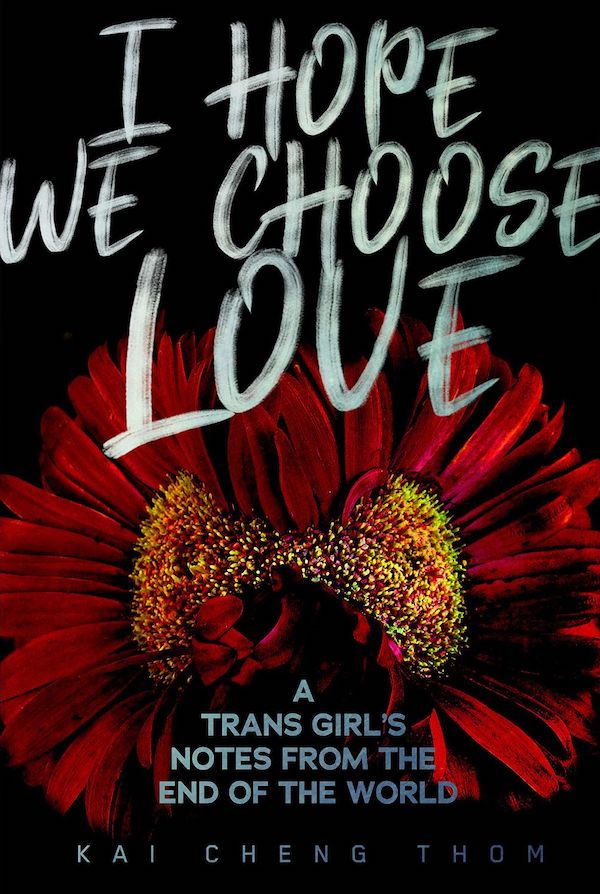
I hope We Choose Love
What can we hope for at the end of the world? What can we trust in when community has broken our hearts? What would it mean to pursue justice without violence? How can we love in the absence of faith?
In a heartbreaking yet hopeful collection of personal essays and prose poems, blending the confessional, political, and literary, Kai Cheng Thom dives deep into the questions that haunt social movements today. With the author's characteristic eloquence and honesty, I Hope We Choose Love proposes heartfelt solutions on the topics of violence, complicity, family, vengeance, and forgiveness. Taking its cues from contemporary thought leaders in the transformative justice movement such as adrienne maree brown and Leah Lakshmi Piepzna-Samarasinha, this provocative book is a call for nuance in a time of political polarization, for healing in a time of justice, and for love in an apocalypse.
Winner of Publishing Triangle Award for Trans and Gender Variant Literature; American Library Association Stonewall Honor Book
Kai Cheng Thom is a writer, performer, and community worker based in Toronto, unceded Indigenous territory. She is the winner of the 2017 Dayne Ogilvie Prize for Emerging LGBT Writers and a two-time Lambda Literary nominee. She has published widely, including the novel Fierce Femmes and Notorious Liars, the poetry collection a place called No Homeland, and (with Wai-Yant Li and Kai Yun Ching) the children's picture book From the Stars in the Sky to the Fish in the Sea.
Published 2019.
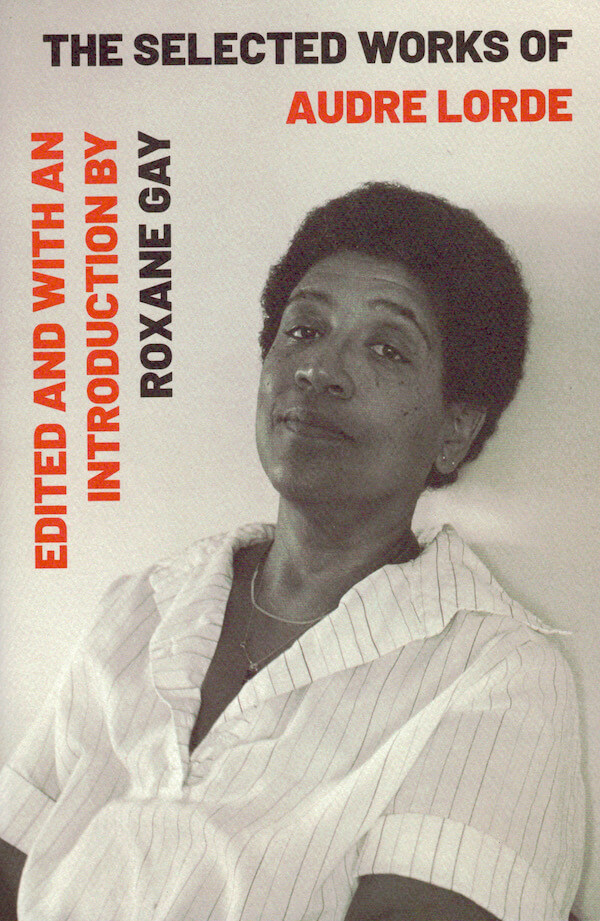
Selected Works of Audre Lorde
A definitive selection of prose and poetry from the self-described "black, lesbian, mother, warrior, poet," for a new generation of readers. Audre Lorde is an unforgettable voice in twentieth-century literature, one of the first to center the experiences of black, queer women. Her incisive essays and passionate poetry-alive with sensuality, vulnerability, and rage-remain indelible contributions to intersectional feminism, queer theory, and critical race studies.
This essential reader showcases twelve landmark essays and more than sixty poems, selected and introduced by one of our most powerful contemporary voices on race and gender, Roxane Gay.
The essays include "The Master's Tools Will Never Dismantle the Master's House," "I Am Your Sister," and excerpts from the National Book Award-winning A Burst of Light. The poems are drawn from Lorde's nine volumes, including National Book Award nominee The Land Where Other People Live. As Gay writes in her astute introduction, The Selected Works of Audre Lorde celebrates "an exemplar of public intellectualism who is as relevant in this century as she was in the last."
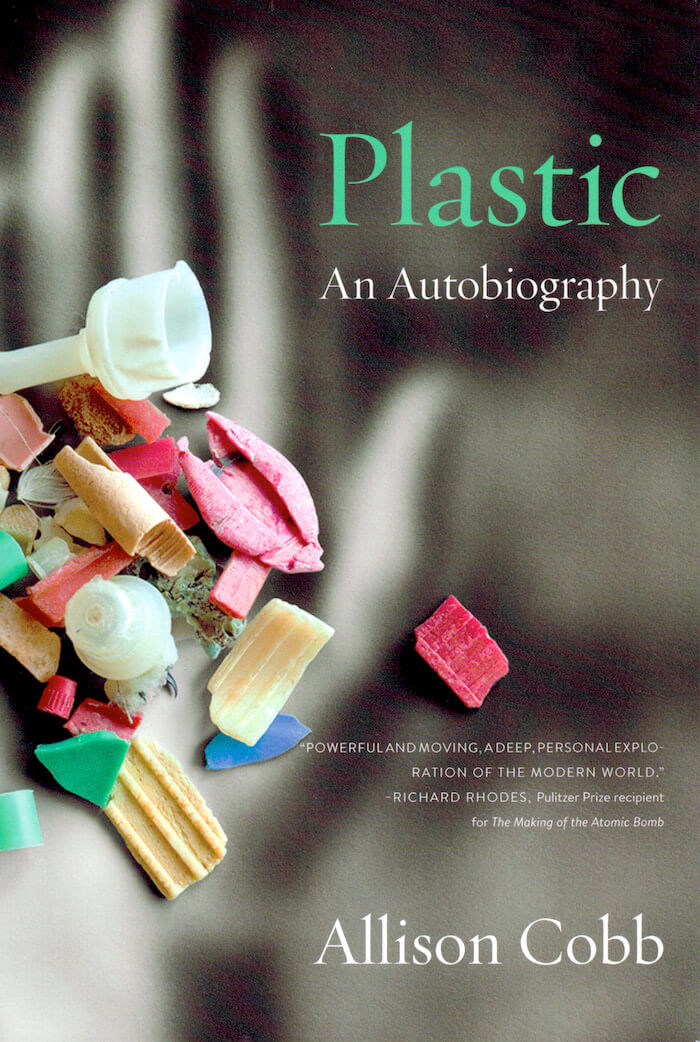
Plastic: An Autobiography
In Plastic: An Autobiography, Cobb's obsession with a large plastic car part leads her to explore the violence of our consume-and-dispose culture, including her own life as a child of Los Alamos, where the first atomic bombs were made. The journey exposes the interconnections among plastic waste, climate change, nuclear technologies, and racism. Using a series of interwoven narratives - from ancient Phoenicia to Alabama - the book bears witness to our deepest entanglements and asks how humans continue on this planet.
Allison Cobb (she/her) is the author of After We All Died, Plastic: an autobiography, Born2, and Green-Wood. Cobb's work has appeared in Best American Poetry, Denver Quarterly, Colorado Review, and many other journals. She was a finalist for the Oregon Book Award and National Poetry Series; has been a resident artist at Djerassi and Playa; and received fellowships from the Oregon Arts Commission, the Regional Arts and Culture Council, and the New York Foundation for the Arts. Cobb works for the Environmental Defense Fund and lives in Portland, Oregon, where she co-hosts The Switch reading, art, and performance series and performs in the collaboration Suspended Moment.
Published April 2021

Post-Comics. Beyond Comics,Illustration and the Graphic Novel
‘Post-comics are much more than just another way of making or telling comics. What post-comics are doing is transferring the art of comics to different fields, different contexts, if not different artistic, cultural, technological and industrial worlds. These new environments may challenge post- comics the same way they themselves have challenged their initial comics setting.’ Jan Baetens

Small Gods — Perspectives on the Drone
Since the first military drone strikes, the drone has been seen as emblematic of Western hegemony, emphasising the asymmetry of modern warfare. The military drone, whose combined surveillance and killing technology was first realised in the 1980s, has given rise to today’s consumer drone, even as drone warfare continues to incinerate civilians in areas of Asia and Africa. By exploring the use of the drone as medium in the works of three artists — Laura Poitras, Anne Imhof, and Korakrit Arunanondchai — Small Gods examines how the drone’s new, consumer format has not left this bloodied legacy behind, but instead imports it into everyday life. It presents a broad and detailed analysis of how socioeconomic and geopolitical concerns have shaped image-making practices, not only in concept but in form, and considers how this has changed our perceptions of humanity itself. More info via http://amfq.net/small-gods

Meet Me In The Present: Documents and their Afterlives
Alex Quicho, Camilla Brown and 1 more
Meet Me In The Present: Documents and their Afterlives is an anthology of essays which examines the power of collective action. Spanning twenty-one acts of resistance — from letters exchanged between black power activists to the ethos of protest being brought into the Victoria and Albert Museum — and with an afterword by critic Orit Gat, these essays consider what it means to survive against all odds within a changing society. Drawing from the motives and experiences of those who have protected the right to access shared resources, Meet Me in the Present tells the stories of these diverse defenders. The book calls for public spaces, and for ideas to be made public in a time when ‘the commons’ is increasingly under attack.
Edited by Alex Quicho, Camilla Brown, Hatty Nestor, Laura Fava, Sarah Thacker, and Zachary Soudan
Design by Tom Finn and Jake Tollady

Darkwater: Voices from Within the Veil
The distinguished American civil rights leader, W. E. B. Du Bois first published these fiery essays, sketches, and poems individually nearly 80 years ago in the Atlantic, the Journal of Race Development, and other periodicals. Part essay, part autobiography, Darkwaterexplicitly addresses significant issues, such as the oppression of women and Eurocentric standards of beauty, the historical rise of the idea of whiteness, and the abridgement of democracy along race, class, and gender lines. Reflecting the author’s ideas as a politician, historian, and artist, this volume has long moved and inspired readers with its militant cry for social, political, and economic reforms for black Americans.